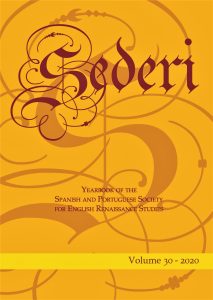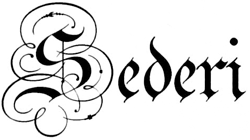
Sederi 30
Sederi 30 — 2020
EDITOR
Ana Sáez-Hidalgo
REVIEW EDITOR
María José Mora
ISSN 1135-7789
Irene Montori, “Representing Creation, Experiencing the Sublime: The Longinian Tradition in Tasso and Milton.” SEDERI 30 (2020): 69–89.
DOI: https://doi.org/10.34136/sederi.2020.4 Download PDF
Abstract
This essay aims to demonstrate how Tasso and Milton were conscious of the Longinian tradition and aware of fashioning a poetry of the sublime when rewriting the story of creation. The author of Il mondo creato incorporates the Longinian model of sublime ekstasis into his concept of meraviglia to construct his own poetics of artistic creation. Despite Milton’s indebtedness to Tasso, in Paradise Lost the English poet distances himself from a full commitment to Longinian ekstasis and locates the sublime in a more dialogical, if not dialectical, compositional model of poetic creation. From a broader perspective, this paper aims to illustrate the centrality of the sublime in fashioning early modern literary poetics.
Keywords: Tasso; Milton; creation; wonder; the sublime
References
Achinstein, Sharon. 2003. Literature and Dissent in Milton’s England. Cambridge: Cambridge University Press.
Ardissino, Erminia. 2003. “Perché Plotino.” In Tasso, Plotino, Ficino. In margine a un postillato, edited by Erminia Ardissino, 13–30. Rome: Edizioni di Storia e letteratura.
Ariosto, Ludovico. 1997. Orlando Furioso e i Cinque canti. Edited by Remo Ceserani and Sergio Zatti. Torino: UTET.
Boileau-Despréaux, Nicolas. (1674) 2007. Traité du sublime ou du merveilleux dans le discours. In Oeuvres completes. Paris: Firmin Didot Frères [Elibron Classics Replica].
Boitani, Piero. 2007. Prima lezione sulla letteratura. Rome-Bari, Laterza.
Cheney, Patrick. 2018. English Authorship and the Early Modern Sublime. Fictions of Transport in Spenser, Marlowe, Jonson, and Shakespeare. Cambridge: Cambridge University Press.
Doran, Robert. 2015. The Theory of the Sublime from Longinus to Kant. Cambridge: Cambridge University Press.
Fish, Stanley. 2001. How Milton Works. Cambridge, MA: Harvard University Press.
Fumaroli, Marc. 1986. “Rhétorique d’école et théorique adulte: Remarques sur la réception européenne du traité ‘Du sublime’ au XVIe et au XVIIe siècle.” Revue d’Histoire Littéraire de la France 86: 33–51.
Goyet, Francis. 1991–1992. “Le pseudo-sublime de Longin.” Études Littéraires 243: 105–19.
Graziani, Françoise. 1996. “Le miracle de l’art: le Tasse et la poétique de la meraviglia.” Revue des Études Italiennes 42 (1/2): 117–39.
Guardiani, Francesco. 1986. “Torquato Tasso. L’umanità della rivelazione nel Mondo creato.” Critica Letteraria 51 (14): 211–24.
Halliwell, Stephen, Donald Russell, and Doreen C. Innes, eds. 1995. Aristotle: Poetics. Longinus: On the Sublime. Demetrius: On Style. Cambridge (MA): Harvard University Press.
Halliwell, Stephen. 2012. Between Ecstasy and Truth. Interpretations of Greek Poetics from Homer to Longinus. Oxford: Oxford University Press.
Hardie, Philip. 2009. Lucretian Receptions: History, the Sublime, Knowledge. Cambridge: Cambridge University Press.
Kates, Judith A. 1983. Tasso and Milton: The Problem of Christian Epic. Lewisburg: Bucknell University Press.
Lehtonen, Kelly. 2016. “Peri Hypsous in Translation: The Sublime in Sixteenth-Century Epic Theory.” Philological Quarterly 95 (3/4): 449–65.
Lehtonen, Kelly. 2019. “The Satanic Sublime in Paradise Lost: Tasso, Charisma, Abjection.” Modern Philology 116 (3): 211–34.
Leo, Ulrich. 1954. “Torquato Tasso alle soglie del secentismo.” Studi Tassiani 4: 3–17.
Lewalski, Barbara Kiefer. 2003. The Life of John Milton: A Critical Biography. Revised edition. Oxford: Blackwell.
Lieb, Michael. 1970. The Dialectics of Creation. Patterns of Birth and Regeneration in Paradise Lost. Amherst: University of Massachusetts Press.
Luparia, Paolo. 1987. “Il ‘Mondo creato’ poema sapienziale.” Giornale Storico della Letteratura Italiana 164 (525): 1–33.
Milton, John. 1953. Complete Prose Works of John Milton [CPW]. 8 vols. Edited by Don M. Wolfe. New Haven and London: Yale University Press.
Milton, John. (1957) 1975. The Christian Doctrine. In Complete Poems and Major Prose, edited by Merritt Y. Hughes, 900–1020. Indianapolis: The Odyssey Press.
Milton, John. (1674) 1993. Paradise Lost. 2nd ed. Edited by Alastair Fowler. Harlow: Pearson Longman.
Morace, Rosanna. 2016. “Note sulla genesi e sulla lingua del Mondo creato.” In “In te son nulla.” Studi sulla poesia sacra di Torquato Tasso, edited by Marco Corradini and Ottavio Ghidini, 111–38. Rome: Storia e letteratura.
Patterson, Annabel M. 1971. “Tasso and Neoplatonism: The Growth of his Epic Theory.” Studies in the Renaissance 18: 105–33.
Platt, Peter G. 1992. “‘Not before either known or dreamt of’: Francesco Patrizi and the Power of Wonder in Renaissance Poetics.” The Review of English Studies 43 (171): 387–94.
Porter, James I. 2016. The Sublime in Antiquity. Cambridge: Cambridge University Press.
Quint, David. 2014. Inside Paradise Lost. Reading the Designs of Milton’s Epic. Princeton and Oxford: Princeton University Press.
Radzinowicz, Mary Ann. (1978) 2015 . Toward Samson Agonistes. The Growth of Milton’s Mind. Princeton and Oxford: Princeton University Press.
Ramachandran, Ayesha. 2015. The Worldmakers. Global Imagining in Early Modern Europe. Chicago and London: The University of Chicago Press.
Schwartz, Regina M. 1993. Remembering and Repeating. On Milton’s Theology and Poetics. 2nd ed. Chicago and London: Chicago University Press.
Scianatico, Giovanna. 1994. “Il poema ‘meraviglioso’. Per un’ipotesi sul Mondo creato.” In Dall’idillio alla visione. Passaggi della differenza tra Rinascimento e Barocco in area napoletana, edited by Raffaele Girardi, Giovanna Scianatico, Raffaele Cavalluzzi and Pasquale Guaragnella, 61–98. Manduria: Piero Lacaita Editore.
Steadman, John M. 1976. Epic and Tragic Structure in Paradise Lost. Chicago and London: The University of Chicago Press.
Sylvester, Joshua. (1605) 1979. The Divine Weeks and Works of Guillaume de Saluste, Sieur du Bartas. Vol. I. Edited by Susan Snyder. Oxford: Clarendon Press.
Tasso, Torquato. 1875. Prose diverse. Vol. 2. Edited by Cesare Gausti. Florence: Le Monnier.
Tasso, Torquato. 1959. Prose. vol. 2. Edited by Ettore Mazzali. Milano and Napoli: Ricciardi.
Tasso, Torquato. 1973. Discourses on the Heroic Poem. Translation with notes by Mariella Cavalchini and Irene Samuel. Oxford: Clarendon Press.
Tasso, Torquato. 1982. Creation of the World. Edited by Joseph Tusiani. Binghamton: Center for Medieval & Early Renaissance Studies.
Tasso, Torquato. (1607) 2007. Il mondo creato. Vols. I.i–ii. Edited by Paolo Luparia. Alessandria: Edizioni dell’Orso.
Teskey, Gordon. 2006. Delirious Milton. The Fate of the Poet in Modernity. Cambridge (MA): Harvard University Press.
